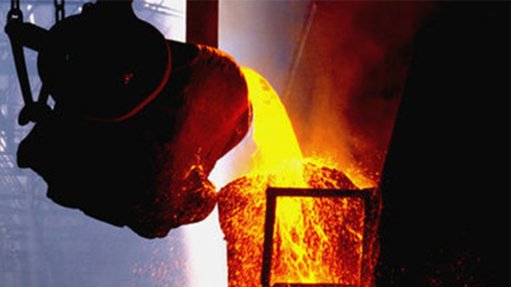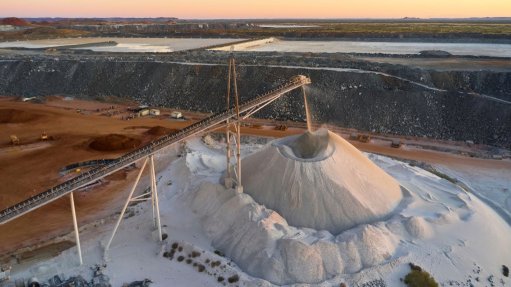Company supplies temporary treatment plant

FIRMLY PLANTED The plant was commissioned at the first site in August 2022 for eight months, and then recommissioned at the second plant in April this year.
Water purification and preservation company Watericon was awarded a 12-month tender to establish a temporary water treatment plant for two of State-owned power utility Eskom’s demineralising plants that were taken offline for maintenance.
Eskom treats and demineralises over 4.2-million litres of water a day and uses the demineralised water for steam generation and to operate boilers at its power plants.
To avoid disruptions to its daily operations, Eskom tendered for an emergency water treatment plant to produce the necessary volumes of ultrapure water (UPW) for its boilers while the demineralisation plants were under maintenance.
While one of Eskom’s plants was taken offline, the emergency plant would supply the necessary demand in its absence. The plant was installed on one site until maintenance was complete, and then taken down and reconstructed for use at the second site.
The plant was commissioned at the first site in August 2022 for eight months, and then recommissioned at the second plant in April this year.
“We were lucky in that we had the necessary equipment available to supply an emergency plant for Eskom. As a result, we successfully built this plant in under three months, so it was a turnkey project for us,” expresses Watericon CEO Chris Ashmore.
Eskom’s specifications for the plant required that conductivity be less than 0.1 µS/cm, silica and sodium content less than 10 ppb, and the flow rate be about 4.5-million litres a day.
Water is used in different parts of the energy generation process. To avoid the corrosion of infrastructure, stringent specifications regarding the water treatment process are necessary to ensure that the water being used is ultrapure.
Hence, Ashmore says that CEDI technology offers more advantages than traditional ion-exchange systems that generate more chemical waste.
“We are running the plant in a way that fits the CEDI modules in a 12 m container that allows for 4.5-million litres of UPW to pass through. CEDI modules require less maintenance and produce better-quality water, which helps to reduce your cost of operation and the cost of your civil works.”
However, while demineralising plants typically require a double-pass reverse osmosis (RO) system to meet high specifications before water goes into the CEDI modules, the company could supply only a single-pass RO system.
“At the time, we only had one pass RO systems in stock, but because the plant needed to be established quickly and on a short-term basis, we ran it with a single-pass RO system,” Ashmore explains.
Additionally, owing to area constraints, the company could not conduct proper civil engineering works to accommodate the plant.
Despite these challenges, Watericon successfully met the three-month deadline and the specific criteria.
“Working with Eskom has been a fantastic experience,” he enthuses.
Meanwhile, Watericon is embarking on an “aggressive growth strategy”, as it expands its operations into the East and West African regions, as well as the Middle East.
The company is also expanding its rental fleet to cater for short-term projects, owing to increasing demand for temporary water treatment plants across various industries.
“Our goal is to be the number one water treatment company in Africa within the next few years. We are establishing bases in West Africa, with offices already established in Ghana, the Democratic Republic of Congo and Zambia. Next year, we will expand into East Africa, with a contract already established in the Middle East,” concludes Ashmore.
Article Enquiry
Email Article
Save Article
Feedback
To advertise email advertising@creamermedia.co.za or click here
Press Office
Announcements
What's On
Subscribe to improve your user experience...
Option 1 (equivalent of R125 a month):
Receive a weekly copy of Creamer Media's Engineering News & Mining Weekly magazine
(print copy for those in South Africa and e-magazine for those outside of South Africa)
Receive daily email newsletters
Access to full search results
Access archive of magazine back copies
Access to Projects in Progress
Access to ONE Research Report of your choice in PDF format
Option 2 (equivalent of R375 a month):
All benefits from Option 1
PLUS
Access to Creamer Media's Research Channel Africa for ALL Research Reports, in PDF format, on various industrial and mining sectors
including Electricity; Water; Energy Transition; Hydrogen; Roads, Rail and Ports; Coal; Gold; Platinum; Battery Metals; etc.
Already a subscriber?
Forgotten your password?
Receive weekly copy of Creamer Media's Engineering News & Mining Weekly magazine (print copy for those in South Africa and e-magazine for those outside of South Africa)
➕
Recieve daily email newsletters
➕
Access to full search results
➕
Access archive of magazine back copies
➕
Access to Projects in Progress
➕
Access to ONE Research Report of your choice in PDF format
RESEARCH CHANNEL AFRICA
R4500 (equivalent of R375 a month)
SUBSCRIBEAll benefits from Option 1
➕
Access to Creamer Media's Research Channel Africa for ALL Research Reports on various industrial and mining sectors, in PDF format, including on:
Electricity
➕
Water
➕
Energy Transition
➕
Hydrogen
➕
Roads, Rail and Ports
➕
Coal
➕
Gold
➕
Platinum
➕
Battery Metals
➕
etc.
Receive all benefits from Option 1 or Option 2 delivered to numerous people at your company
➕
Multiple User names and Passwords for simultaneous log-ins
➕
Intranet integration access to all in your organisation


















